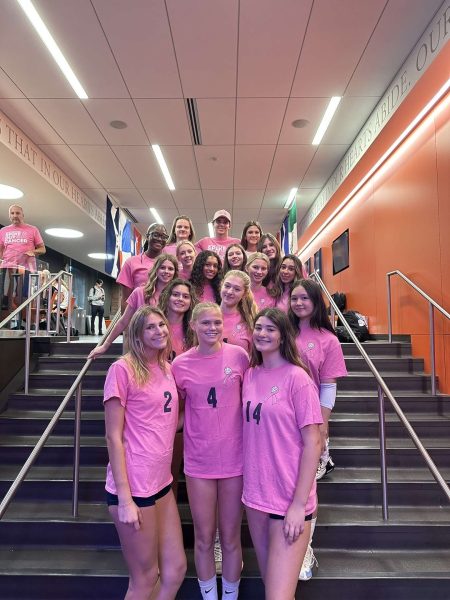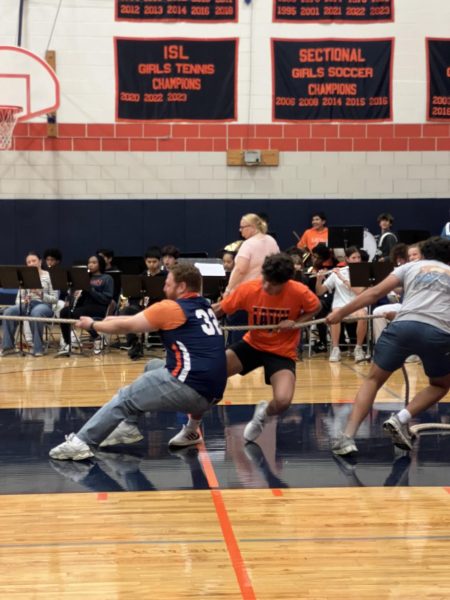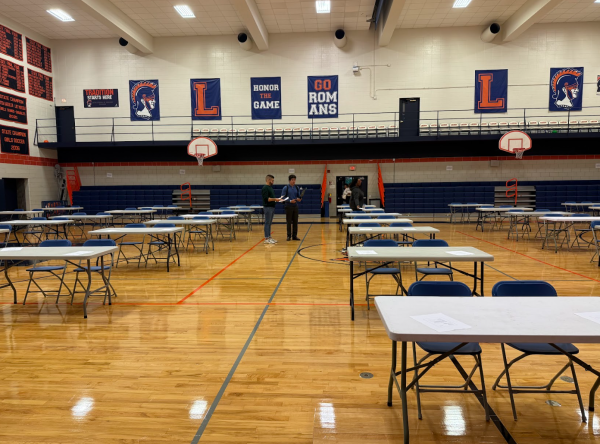No Notes, No Time: Pandemic AP Exams Produce Added Pressure
It’s not unusual for AP exam season to elevate stress levels among students, but the College Board’s decision to administer the tests closed-note with time constraints this year has provoked further student-body anxiety.
“We’ve maybe done a little bit less work and a little less practice in the interest of not being overwhelming during the middle of a pandemic,” math teacher Danika Amusin said. Ms. Amusin explained that her AP Calculus AB class has followed a similar pace compared to past in-person years, but she cut out some topics that she would usually teach, because they’re not on the AP exam. “I feel like there’s the possibility that some content is a little bit more surface level for students rather than deeper and having practiced it more,” she said.
Despite some teachers admitting to slowing down the pacing of their classes, senior Shahab Kousheshi hasn’t noticed a difference. “I think since AP is still covering all the same material it normally would, the classes are working at about the same pace that they would normally with the same workload as last year,” he said.
Still, other students have sensed changes in their AP class curriculum. Senior Malia Brandt, who takes multiple AP classes, said, “I know there are some projects we are skipping remotely, or we are spending less time in person doing lectures and relying more on outside of class, individual-style learning.” Malia still thinks her AP classes are productive online, but she added, “It definitely is harder on students knowing that we will be taking the full exam as if we had learned the curriculum in person and in a more productive environment.”
In addition to pacing concerns, AP Statistics teacher Tim Kendrick worries about the format of the AP exams. To mitigate academic honesty concerns while testing remotely, many Latin teachers allow students to use their notes on assessments, but the AP exams—despite their virtual option—will prohibit the use of any outside resources. “As much as you want to buy into academic integrity being on honor, I am just skeptical about how that will be enforced,” Mr. Kendrick said. With the exam’s remote option, students who decide to take their tests from home may have an unfair advantage.
Ms. Amusin doesn’t share the same cheating concerns regarding the AB Calculus exam: “The reality is that if there are more complicated things that you feel like you need to look up, you won’t have time to look them up and do the problem effectively,” she explained. While the timing constraints may force students to work more efficiently, perhaps they will also hinder a given student’s ability to cheat.
After hearing on Thursday morning that the AP exams will be closed-note, Mr. Kendrick reached out to the other AP math teachers to discuss potentially changing how he administers assessments. “We can’t all of a sudden have the kids be assessed in our courses for an entire year one way, and then the exam comes, and they have no support materials,” he said.
Unlike his colleagues, AP BC Calculus teacher Chris van Benthuysen already administers his tests closed-note, but he gives assessments asynchronously, allowing students ample time to complete their assessments. “I will say one thing that I’m mildly concerned about—that I’m hoping to address this semester by using AP central website to do some assessment—is the timing constraint on exams,” Mr. van Benthuysen said. He said he plans on transitioning to timed tests to prepare students for completing their exams more quickly.
Mr. van Benthuysen also remained optimistic that he will get through all the course’s content, despite teaching at a slightly slower pace this year. “Normally, my schedule for my sort of pacing is set up so we finish a good week or two prior to the actual exam so we can review,” he said, “so I might eat into that a little bit.” Additionally, Mr. van Benthuysen said he intends on using the second week of March, the would-be Project Week, to catch up on his curriculum.
Latin students also may have the opportunity to take their test in the second half of May and first half of June instead of only during the first two weeks of May. The College Board announced that they will work with schools “to support schools that want more instructional time before testing,” enabling teachers to teach more material and review before the exams. The College Board will also waive cancellation fees this year and provide pacing guides for classes that had yet to cover 25% of the material in their first semester.
“If people have it as a goal to do well on the AP exam,” Ms. Amusin noted, “I feel completely confident, both in their ability to learn all the material that they need to and in the vast amount of support they have in learning that material.” She mentioned that with outside resources, such as Khan Academy and AP Classroom, she remains confident in Latin students’ potential for success on their exams. “We could have a completely different conversation if we were talking about public schools where the setting is so different.”
So, how prepared do AP students who attend Chicago Public Schools feel?
“The material is pretty similar, but the way it’s taught has definitely changed how much of it I understand and how well I retain it,” said junior Charlotte Patti, who attends Walter Payton College Preparatory School. Charlotte noted that her teachers’ efforts in making material engaging online declined throughout the first semester, and she finds it more difficult to ask questions in class. “Because it’s impossible to have the hands-on learning experience that we would in person,” she said, “I don’t think I’ll be able to understand a lot of the content on the AP exam that I might have if we had been learning in person.”
Maddie Bates, a sophomore at Lane Tech, also said she thought her AP class pacing was pretty consistent with previous years, but she thinks learning in a remote environment will come at a detriment to her scores. “I think having the full AP is definitely going to be a huge challenge and affect my scores because I haven’t gotten the same education as someone in school,” she noted. Unlike Chicago Public Schools, Latin switched to hybrid learning in the second semester and changed the schedule to accommodate students, giving them a learning advantage over students at public high schools. “With all the distractions of online learning, such as electronics, family members, and home drama, focusing during class is so much harder than in a school setting,” Maddie said.
“It would be disappointing to retake APs in college because I’ve worked so hard this year even through difficult situations,” Charlotte said.
Maddie echoed Charlotte’s sentiment, noting, “It would really be a bummer to fail the AP test and have to retake the same course in college.”
“In some ways, I think it can be perceived as it’s going to hinder students in that you’re trying to get through the same amount of material in less than optimal circumstances,” Mr. van Benthuysen said. “On the other hand, I would say in some ways, it’s setting a bar and saying, ‘You gotta clear this bar,’ and that, in some ways can be a good thing.” Mr. van Benthuysen explained that if a student passes out of their test without understanding all the required material, they won’t be set up for success in subsequent classes.
“In terms of retaking AP courses in college, I don’t think I would mind it, because I think it would go more in depth than an online high school course would,” Malia said. “But,” she added, “I would be more bored and less interested in engaging in classes that I took as APs in high school than if I were taking a course of all new material.”
“At most schools, while, yes, they’ll look at AP scores if you submit them, they’re not a hugely influential part of the college process,” Latin college counselor Alexandra Fields said. She noted that many schools don’t offer APs, so colleges can’t only assess a student based on their scores. Likewise, Ms. Fields explained, “An AP class also has your grade in the class, and that is representative of a year or semester’s worth of work versus just a test.” Colleges assess students holistically, so their AP exam results shouldn’t inhibit their ability to get into a selective college. “The important thing to remember is that they’re going to see trends across all their applicants,” Ms Fields added. If average student scores plummet, the data will suggest an overall trend and imply that testing and schooling circumstances may factor into the results.
“I feel confident that Latin students are going to be able to rise to the conditions that the College Board is setting,” Ms. Amusin concluded, “but I don’t want to say that that was the right decision on the College Board’s part, because they hopefully have a view nationwide and hopefully they’re taking into account the different circumstances of all the different communities.”

Marin Creamer ('22) can’t wait to serve her first year as an Editor-In-Chief for The Forum. Writing and editing for the publication has been...




















































